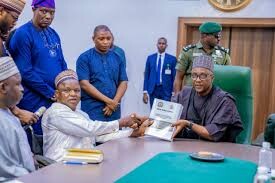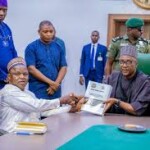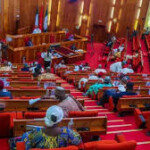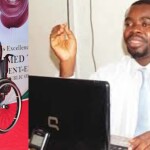Nigeria’s Parliament condones the humanitarian character the executive gives its disability law—and worries Nigerians consider it a joke six years on.
Gideon Oladimeji
The House Committee on Disability invited Rt. Hon. Tajudeen Abbas to do the honour during its Discrimination Act 2018 Amendment ritual hearing on October 15. And the Speaker, through Hon. Julius Ihonvbere, spoke a mouthful. His lamentation about Nigerians’ attitude to disability and the Act’s implementation was a tear-jerker.
“What kind of people have we become?” Abbas didn’t expect an answer. “We must do the right thing, and I am happy this is taking place”
For the impunity in the public and the private sectors, he blamed all the ministries, departments, agencies, and everything else except one: the National Commission for Persons With Disability (NCPWD).
The commission has the responsibility to “ensure”, “enforce compliance”, and “formulate policies” and guidelines for implementation, according to the Act’s Section 38. But Abbas refused to rail against the NCPWD for its dereliction. Nor did he suspect it lacks the powers for such roles where it hibernates—under the Humanitarian Affairs Ministry. It is, however, a point the committee Chairman Dawodu Bashiru cannot ignore. And some disability policy wonks ER spoke with readily identified it as an aberration incapacitating the commission in implementing the law.
But all Abbas’ gushing about the universality of disability, the potential of PWDs, and the House readiness to help made for a good psychodrama. And the hearing organisers could not have appreciated it better.
The House has always put up this façade when it comes to disability. In February, Hon. Ibrahim Mohammed put a lot of pep in his motion to investigate the Act implementation and compliance. Two months before then, Bashiru promised amendments to some gaps in the Act, for better implementation. A day after the October hearing, Dawodu still moved a motion similar to Mohammed’s, whose investigation report never came into the open. That was if anybody heeded Mohammed’s motion at all— the same fate that awaits Bashiru’s.
To the disability policy observers, the problem of the Act implementation goes deeper than this bubble of emotion. And sparing the NCPWD at the heart of the matter, with all its redundancy, is like ignoring the elephant in the room.
Maybe the amendment could start from there.
The commission, by design, is not supposed to be subsumed under any ministry, Opeolu Akinola, a disability policy expert, told ER in an interview. “There is a design we proposed, and it is for it to be under the presidency,” he said while commenting on NCPWD’s capability to ensure the law works.
Except for the aberration in its spirit, the law, in its letter, hasn’t strayed from that design. The commission’s establishing provision in Section 31(1) says: There is established the National Commission for Persons with Disabilities (in this Act referred to as the Commission) to be placed under the presidency. And Section 39(3) later reinforces it: The commission shall not be subject to a direction, control or suspension by any others authority or person in the performance of its functions under this Act except the President.
Besides these, the design also seems the standard practice. Other countries, Akinola explained, make their disability commissions independent of any ministry. “If the NCPWD had been under the presidency, its executive secretary would almost have been at par with any minister in Nigeria,” he said. This could have been good for accountability in its relationship with other ministries in implementing the law. “But the finance ministry, for instance, is now not bound to respond to a commission under the humanitarian affairs ministry.” And the supervising minister who can intervene on time might have other fish to fry. Even when the commission manages to get the minister’s attention, Akinola noted, there will be a riot of sorts. “Any time the interest of the minister conflicts with that of the PWDs, the interest of the PWDs suffers.”
This has been the commission’s experience since 2019 when Muhammadu Buhari, then president seeking re-election, assented to the bill.
To Lukman Salami, neither Buhari nor the politicians on the soap box today were intentional about legislating for disability in Nigeria. “What led to the assent was a matter of political patronage,” the Lagos JONAPWD chairman told ER. According to him, Sadiyat Farouq, then humanitarian affairs minister, became the face of the bill in the cabinet following her pledge at a conference a special adviser on special needs and equal opportunities to the then Speaker organized. “I believe it was because of her being the one that pushed for the assent that the president now put her in charge of the commission,” the lawyer said.
That decision teed-off the game of disregard for the law ever since.
Abbas ought to have traced the six-year-long impunity—the MDAs “thinking the Act is a joke”—to this original sin right in the presidency.
Salami, though, espoused a counter-argument: the commission could be anywhere the president chooses since all executive powers reside in him. “Some people will argue even if the NCPWD is under the Humanitarian Affairs Ministry, it is still under the presidency,” the lawyer said.
Mohamed Abba-Issa, senior special assistant, Special Needs and Equal Opportunities, presidency, didn’t respond to ER questions on the matter.
Like Akinola, Salami, however, agreed when it comes to administrative decisions, a minister cannot command his colleague to do certain things. “Had it been the government was intentional about implementing the law,” he said, “the commission ought to have been under the direct supervision of the presidency which can give directives to any ministry.”
He cited the EFCC for illustration. While it is under the Justice Ministry, the anti-graft commission takes action without permission from the justice minister. And it also relates directly with the presidency. “It was structured that way because it was the government seeking solution to corruption,” he said. “But for the disability law [and the NCPWD], we are the one seeking solution, not the government.”
But wherever it operates, the commission, Salami believes, has no excuse for letting public attitude blunt the disability law. And its adoption of “the charity approach” to make the law work hasn’t changed the situation —“except for putting a PWD at the head of the commission just to say we, too, are practising inclusion”.
Hon. Bashiru wouldn’t clarify to ER why the presidency disregarded the law, and got away with burying the NCPWD in a ministry that gives disability a humanitarian coloration. He only confirmed his committee is aware of the impunity. ..”It’s under section 31(1) and we are looking into it as part of our implementation plan,” he told ER last December.
The plan has yet to materialize in any shape or form till now.
He and his committee have again vowed to move heaven and earth for the Act implementation. The focus now is on accessibility, employment, disability inclusion in policy, plans, programme and projects of the MDAs. “Of special interest is accessibility to public building and the use of sign language interpreters in the media and all public communication,” he said.
But they haven’t charted the course to these outcomes. Since the hearing, there has been no bill on the floor proposing any amendment. Bashiru only moved a motion later in the House—to investigate access to public and private buildings.
The motion arrived a tad too late. A pro-active committee could have done that immediately the five-year transitory period the Act provides for retrofitting accessibility features ended in February.
That the House, under Abbas, adopted the motion, despite its wild-cat nature and the cluelessness of the implementing NCPWD, makes a bigger joke.
And all the comedy comes to one thing: the executives flouting the disability law, and the lawmakers fussing about public impunity. Many may take the fret as tilting at windmills. But the lawmakers, at least, create impressions of working.







